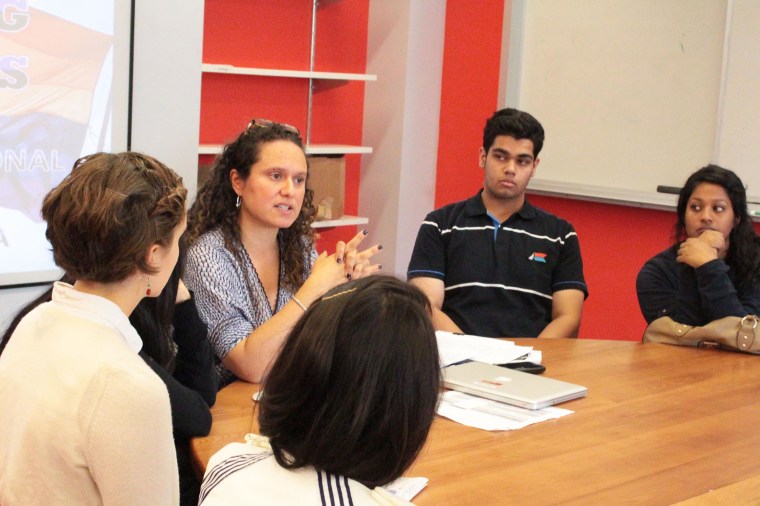NEW YORK, NY -- Women's rights and the feminist movement have a long, storied place in American history, yet it's very much a part of our current social media conversation. Young actresses such as Emma Watson and Taylor Swift are speaking out publicly about the misconceptions of feminism, and non-profit organizations such as Hollaback are creating experimental videos about street harassment. Beyond the U.S., the killings of Miss Honduras and her sister have put a recent spotlight on the violence against women in Latin America and around the world.
Ileana Jiménez, a teacher at the progressive LREI school in New York City, has taken a unique approach to educating the next generation about feminism. In 2008, the she created an engaging elective class for high school Juniors and Seniors on the different faces of feminism and activism. Known as Feminist Teacher - which is also the name of her blog - Jiménez has an 18-year history in education and has been widely recognized for her work teaching activism and feminism. Her students even have a blog, F To The Third Power, where they contribute their stories and their work.
Here are six questions NBCNews.com asked the Feminist Teacher, condensed and edited:
Why do you teach feminism to your students?
Feminism itself is a passion of mine. I think it is very powerful to teach it at the high school level because young people are really trying to find the language that is relevant to their lives and to describe the experiences they are having. Feminism provides the language to know themselves. It provides a lens for understanding exactly what they have instinctively known was an injustice but maybe they didn’t always have the language. This class allows them to learn that language and to take action on it.
What is one important thing students take away from your class? What are some projects they work on?
I think the most important thing that we do in the class is we learn the theory of intersectionality - the course not only focuses on issues of gender, but rather, social class, ethnicity, human rights, and complex and nuanced ways of understanding who we are.
Part of what the students walk away with is how to use that - [there are] different issues people don’t associate with feminism such as poverty, immigration and education, and how they apply it to their lives.
We’ve done a number of projects. Currently, my students are working on projects on how to address street harassment. A group of girls are creating a blog for girls of color. Another student is creating a game for children to learn about woman in politics and someone is working on designing a class on white privilege. The purpose of the project was to pick an issue and figure out how to address it through a feminist lens. The problems they have identified are important to them and they have solutions they want to present to a wider audience.
Do you think that with the Internet more young people and teenagers are getting involved with and becoming aware of feminism and things such as street harassment?
Definitely. Street harassment is one issue that feminism addresses. It’s an issue that resonated really powerfully with my students because it’s something they experience everyday. They would experience it going from school to home and anywhere else in between. In my experience, the students who share stories have faced street harassment in public spaces such as the subway and other public arenas, [and] having an outlet on these issues is important to them. Some of my students have been featured on blogs such as Stop Street Harassment.
Do you think issues such as street harassment are a problem specific to just one culture or all cultures?
Street harassment is an international and global phenomenon. It’s not limited to one particular culture or region of the world. It is something that happens globally.
I was in Mexico on a Fulbright. There was a large march that was a part of the Slutwalk in Mexico City. The walk was very powerful because it used a lot of the Latin American forms of activism - puppetry, theater and public theater - as a way to address sexual harassment and street harassment that happens every day in public spaces. Stress harassment is something that is experienced particularly by women of color, queer people and queer people of color. There is research by the organization Stop Street Harassment that backs this up.
What do you think still needs to be done to tear down the misconceptions of what feminism means?
Education. The reason why I teach feminism in school is because I want a better world...I think if we were to teach feminism to students K-12 we would not have such high instances of gender-based violence. If we addressed these issues from a very young age, we wouldn’t have such a world full of racism and sexism.
Is there something else you would want people to know about your course?
I’m a Latina teacher who is queer and a feminist and I bring my whole self to this work - one thing I do in my class is have the students write an intersectionality essay, a personal piece about their stories. They then share it with each other. That is really a community building moment. They hear each other’s lives come to flesh and voice in the room. If we would know each other on a deeper level then we would have less conflict.
